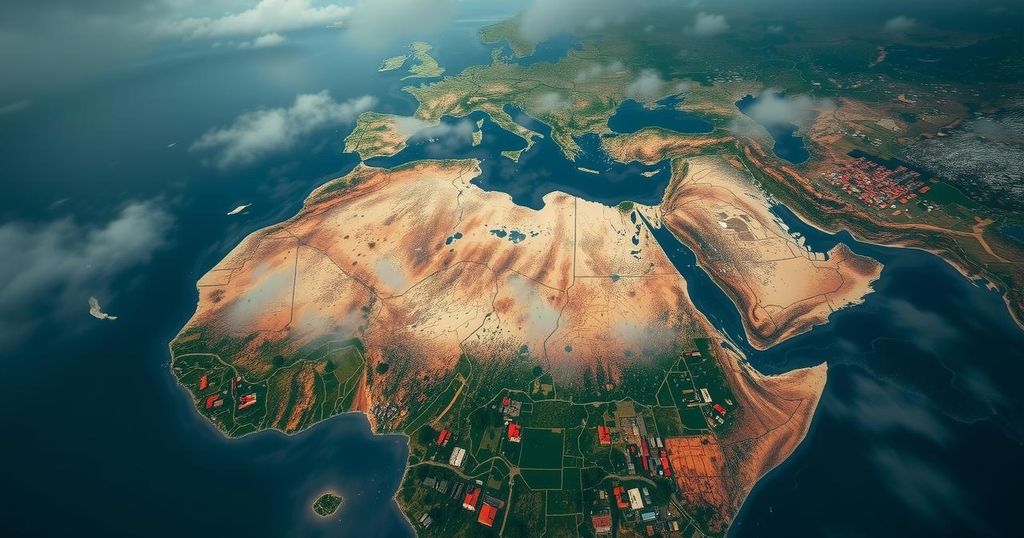This article highlights the worsening impact of climate change on floods across Africa, particularly in Nigeria’s Kogi State, where residents face increasing severity of flood events. Over 6.9 million people have been affected this year, and local testimonies emphasize the dire conditions affecting homes and food security. Experts warn of the need for global action to address climate change, as Africa bears a disproportionate burden despite contributing minimal greenhouse gas emissions.
For the past twelve years, floods have repeatedly inundated the residence of 67-year-old Idris Egbunu in central Nigeria. Each rainy season brings the same unfortunate circumstances; the Niger River overflows, submerging his home for extended periods until he is able to return to assess the resultant damage, which necessitates thorough cleaning, repairs, fumigation, and repainting in anticipation of subsequent rains. In Lokoja, Kogi State, where the Niger River meets its primary tributary, the Benue, flooding is a predictable occurrence. However, the impact of climate change has rendered these floods more severe and frequent. This phenomenon is now threatening the survival of millions across Africa. Devastating floods have destroyed homes and crops, undermining food security across the region. According to data from the United Nations Office for the Coordination of Humanitarian Affairs (OCHA), approximately 6.9 million people in West and Central Africa have been affected by torrential rains and flooding thus far in 2024. Local residents and officials noted that flood intensity in Kogi State escalated in 2012 and has wreaked havoc annually thereafter. In 2022, Nigeria experienced its worst flooding in a decade, resulting in over 500 fatalities and displacing 1.4 million individuals. Sandra Musa, an emergency agency adviser to the Kogi State governor, remarked that while this year’s challenges are significant, they have yet to match the 2022 crisis severity, noting, “Usually at this time of year the water level drops, but here it’s rising again.” The floods have already impacted an estimated two million individuals in the state. Fatima Bilyaminu, a 31-year-old mother and shopkeeper, is currently reliant on boat transport to reach her residence in Adankolo, where floodwaters nearly breach her windows. She lamented, “I lost everything. My bed, my cushioned chair, my wardrobe, my kitchen equipment,” highlighting the dire circumstances faced by many. Despite only contributing approximately four percent to global greenhouse gas emissions, Africa is disproportionately suffering the repercussions of climate change. A report by the World Meteorological Organization has stated that this year is poised to become the warmest on record. Aida Diongue-Niang from the UN’s Intergovernmental Panel on Climate Change (IPCC) noted, “This year has been unusual in terms of the amount of rainfall, with many extreme events, which is one of the signs of climate change.” The Sahel region, bordering the Sahara, recorded unprecedented rainfall volume and intensity, while parts of Niger saw a 200 percent increase in precipitation compared to previous years, threatening historical sites such as the UNESCO World Heritage city of Agadez. In Chad, flooding since July has resulted in at least 576 fatalities and affected 1.9 million people. The UN reported that in Cameroon, torrential rains have ravaged over 56,000 homes and inundated substantial agricultural lands. The flooding extends beyond Nigeria, causing significant disruptions throughout the region, including Conakry, Guinea, and Bamako, Mali, where entire districts faced submersion. As a consequence, many countries have deferred school openings due to adverse conditions. Clair Barnes from Imperial College London emphasized the shift from a cyclical flooding pattern to annual occurrences, suggesting further deterioration is imminent without intervention in fossil fuel usage. Experts predict that by 2030, an estimated 118 million impoverished Africans will face threats from increasing floods, droughts, and extreme heat. Youssouf Sane, a meteorologist from Senegal, warned that construction along riverbanks significantly aggravates the situation, urging thoughtful planning in the context of urbanization and climate change. Yet, Diongue-Niang insists that the resolution to extreme climate impacts transcends regional actions, necessitating collective global efforts to reduce greenhouse gas emissions.
Flooding in Africa, particularly in areas like Kogi State in Nigeria, has intensified over the years due to the exacerbating effects of climate change. The occurrence of flood events is linked to shifting weather patterns associated with global warming, with dire implications for local communities. As Africa grapples with both environmental challenges and socio-economic vulnerabilities, the interrelationship between climate change, infrastructure planning, and emergency response becomes ever more crucial.
In conclusion, climate change has significantly aggravated flooding across various regions of Africa, leading to profound humanitarian crises and threatening livelihoods. The testimonies from residents, combined with statistical data highlighting the scale of the crisis, underscore the urgent need for comprehensive strategies to address both the immediate impacts of flooding and the underlying causes, particularly the reduction of greenhouse gas emissions on a global scale.
Original Source: www.barrons.com






